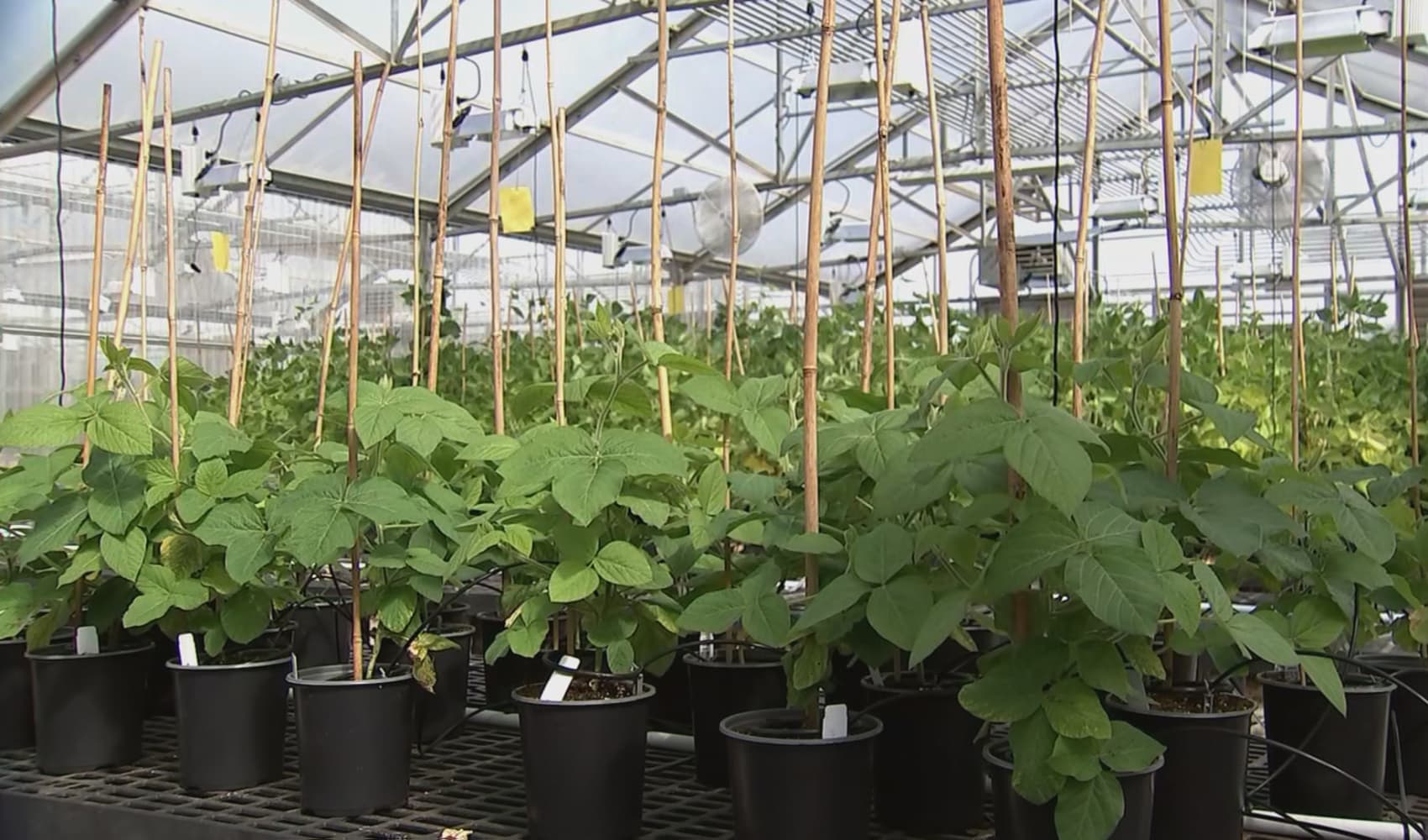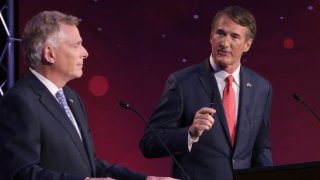
- Without any other hotly contested big races this fall, all eyes are on Virginia as Democrats try to weather a decline in President Joe Biden's approval ratings.
- Former Gov. Terry McAuliffe, a Democrat, and Republican Glenn Youngkin, are polling neck-and-neck in the commonwealth's gubernatorial race.
- The results of the Nov. 2 election could act as a preview of the nation's political landscape ahead of the 2022 midterms.
Without any other hotly contested big races this fall, all eyes are on Virginia as Democrats try to weather a decline in President Joe Biden's approval ratings.
Former Gov. Terry McAuliffe, a Democrat, and Republican Glenn Youngkin, are polling neck-and-neck in the commonwealth's gubernatorial race.
The results of the Nov. 2 election could act as a preview of the nation's political landscape ahead of the 2022 midterms. The only other major contest of note this November is in New Jersey, where Gov. Phil Murphy, a Democrat, is expected to win reelection.
Get Philly local news, weather forecasts, sports and entertainment stories to your inbox. Sign up for NBC Philadelphia newsletters.
McAuliffe, who served as governor from 2014 to 2018, aims to continue a winning streak for Democrats in statewide races that began in 2012.
Youngkin, a political newcomer and former CEO of global investment giant Carlyle Group, hopes to break that run and snag a first-in-a-decade statewide win for the GOP.
Here are the key themes of the race:
- The potential effect of Biden's approval ratings
- Youngkin's business background and wealth
- The fight over Covid vaccine mandates
- The Trump factor
- Virginia's role as a national bellwether
- An intense final stretch
The last two presidential elections might suggest that Democrats are in solid shape to prevail. Biden, who has endorsed McAuliffe, won Virginia by 10 percentage points in the 2020 election, and Hillary Clinton won Virginia by over 5 percentage points in 2016.
Money Report
Democrats also made huge gains while former President Donald Trump was in office, taking full control of the commonwealth's government in 2019 after big wins in 2017, when they wiped out Republicans' overwhelming majority in the Virginia House of Delegates.
All of which indicates that the commonwealth has leaned comfortably blue in the past decade.
But with Biden's approval ratings waning in recent weeks, Republicans see an opportunity to reclaim power in Virginia and secure an advantage in the midterm elections next year. The latest polling in the governor's race shows the candidates in a dead heat.
The gubernatorial race will be the first competitive statewide election in the nation since Biden took office. It will also be one of the last before Democrats will fight to defend their razor-thin majorities in the Senate and the House of Representatives.
Potential Biden effect
Recent polling indicates a tighter-than-expected race to succeed Democratic Gov. Ralph Northam, who is unable to seek reelection this year because Virginia law prohibits governors from serving consecutive terms.
A Monmouth University poll released Wednesday found the race between McAuliffe and Youngkin moving to a dead heat, with support identical at 46%. Previous polling from the university in September and August found McAuliffe with a 5-point lead over his Republican counterpart.
Another survey, conducted Oct. 4-11 by YouGov and CBS News, found McAuliffe with a 3-point lead over Youngkin among likely voters, an advantage within the survey's 4.1-percentage point margin of error. McAuliffe hit 50%, while Youngkin trailed closely behind with 47%.
An Emerson College poll from earlier in October also found McAuliffe with a slight lead over Youngkin among likely voters, at 49% to 48%. A previous poll conducted by the college in September showed McAuliffe with a 4-point lead over his Republican counterpart.
Some experts believe that McAuliffe is still likely to secure a victory in the blue-leaning state.
"Virginia's turn toward the Democrats in recent years is very helpful to McAuliffe," said Kyle Kondik, managing editor of Sabato's Crystal Ball, which analyzes congressional races. "While I don't think anybody should be surprised if Youngkin were to win, I still think McAuliffe has the upper hand in this race."

However, others warn that Biden's declining job approval ratings could pose a threat to McAuliffe's campaign.
The YouGov and CBS News survey found the president's approval rating at 48% among likely voters in Virginia. About 52% disapprove of the job Biden is doing, including roughly 1 in 8 of his 2020 Virginia voters, according to the survey. Similarly, the Emerson College poll found Biden's job approval rating underwater in Virginia, with approval at 48% and disapproval at 52% among likely voters.
These Virginia numbers echo the overall national decline in Biden's job approval ratings.
"The polls we see reflect somewhat of a disappointment with Biden. If something good happens for his administration in these next two weeks, that could help Democrats' chances in this race to some extent," said Karen Hult, a political science professor at Virginia Tech.
"But otherwise, if I were making a prediction at this point, it does look to me as though Glenn Youngkin might in fact be able to win the election, especially given Biden's low approval ratings."
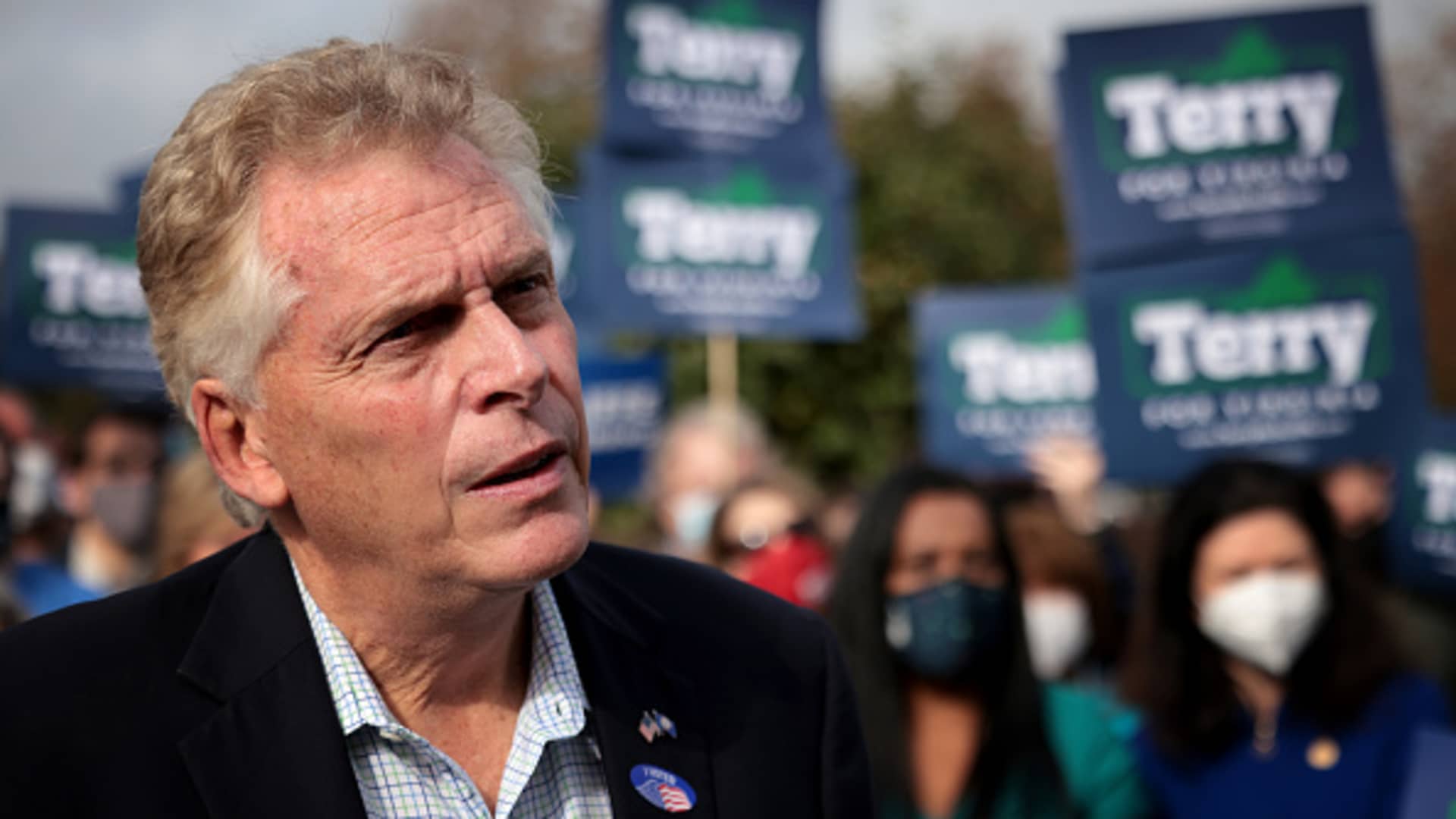
McAuliffe has called Biden's falling approval ratings a challenge for his campaign.
"As you know, the president is unpopular today, unfortunately, here in Virginia, so we've got to plow through," McAuliffe said at the rally, Axios reported.
A spokesperson for McAuliffe did not respond to CNBC's request for comment.
In 2013, McAuliffe was able to overcome a similar situation to win the governor's office. Former Democratic President Barack Obama's approval ratings in Virginia hit the mid-40s during that year, but McAuliffe came out on top in another close race against a GOP opponent.
However, Youngkin may be a more formidable Republican foe than the candidate in 2013, then-Virginia Attorney General Ken Cuccinelli.
Cuccinelli, who went on to serve in the Trump administration, was cast as a right-wing ideologue. McAuliffe also had a big money advantage.
Youngkin has no political track record to attack and has an enormous amount of personal wealth to spend on his campaign.
Youngkin's business background
McAuliffe has a campaign war chest of nearly $44.4 million, while Youngkin's campaign has raised $42.2 million, according to the latest figures from the Virginia Public Access Project.
Youngkin remains the top donor to his campaign, pouring in $17.5 million out of his own pocket. His wealth likely comes from his 25-year tenure at the Carlyle Group, where he received about $37.3 million in total compensation in 2018 alone, according to the firm's regulatory filing for that year.
Youngkin retired from the global investment group in 2020 to pursue a career in politics. He has never served in office but has touted his outsider status in his campaign.
"I'm not a politician, and I certainly don't have the 120 years of combined political baggage that my opponents have," Youngkin said in a press release announcing his candidacy in January.
A spokesperson for Youngkin did not respond to CNBC's request for comment.
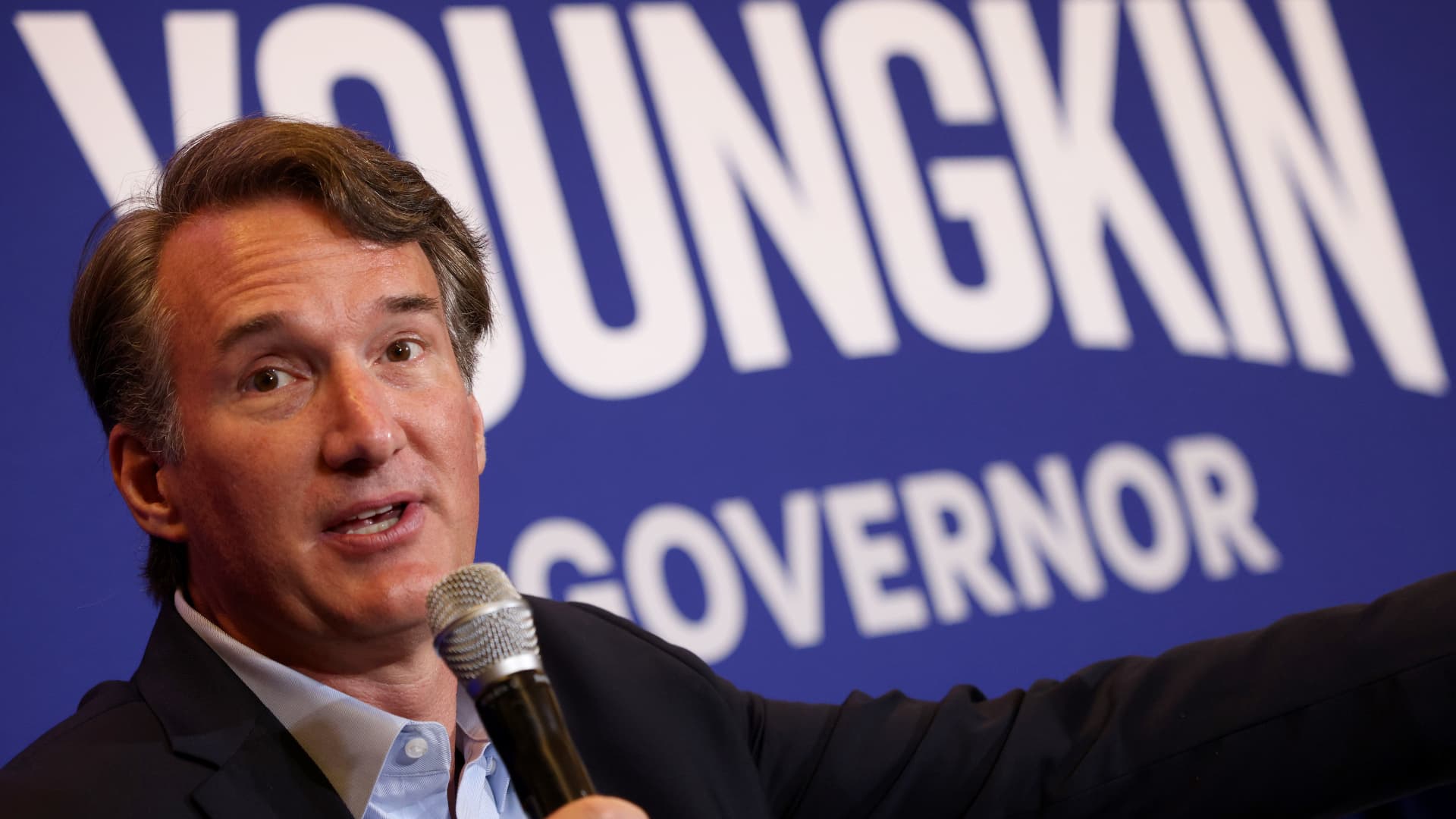
Youngkin has made his business experience a central part of his pitch to voters, arguing that his "common-sense, business-like execution" sets him apart from other candidates and enables him to lead the state.
For instance, his campaign website says that he co-founded the Virginia Ready Initiative, which was built in response to the Covid-19 pandemic and helps Virginians find new jobs.
His campaign website also touts his "key role" in the Carlyle Group, claiming that he has helped fund the retirements of frontline public workers and supported hundreds of thousands of American jobs.
However, unnamed sources close to the global investment firm have contested the picture Youngkin has painted of his tenure there, Bloomberg reported.
The sources told Bloomberg that Youngkin actually made several bad investments that cost the company billions of dollars before he "flamed out" as CEO, citing "troubled forays" into hedge funds and energy investments over the past decade.
Nevertheless, Hult said Youngkin's business background has appealed to many Virginia voters who are concerned about the state's economy.
Virginia has fared well in weathering the economic impacts of the Covid pandemic. In August, the state's seasonally adjusted unemployment rate dropped to 4%, which is 3 points lower than the rate from a year ago and below the national rate of 5.2%. Virginia also saw job gains of 2.2%, with nine of 11 major divisions experiencing employment gains on a seasonally adjusted basis.
Despite these figures, Hult said some Virginians remain concerned about job growth and the distribution of jobs throughout the state. Recent polling indicates that they believe Youngkin can best address that concern. The YouGov and CBS News survey found voters, by a slight margin, think Youngkin will do better at creating jobs. Youngkin also leads among likely voters who view the economy as a major factor in their vote.
Vaccine mandate fight
Several national issues have rocketed to the forefront of Virginia's gubernatorial race. Covid vaccine mandates top the list.
The two candidates, who both say they are fully vaccinated, have consistently maintained opposing positions on vaccine mandates.
McAuliffe would require Covid vaccines for students, teachers and health-care workers and would support businesses that imposed such mandates. He launched a promotional campaign called "Virginia is for Vaccine Lovers" — a play off the state's tourism slogan — that aims to get every eligible Virginian vaccinated and has backed Biden's vaccine requirement for federal employees.
Youngkin opposes mandates.
"I've gotten the vaccine; my family has gotten the vaccine. It's the best way for people to keep themselves safe. And I in fact have asked everyone in Virginia to please get the vaccine," Youngkin said in the first gubernatorial debate last month. "But I don't think we should mandate it."
Youngkin has argued that McAuliffe's mandates will force teachers and health-care workers who oppose getting vaccinated out of their jobs.
"We need those health-care workers. We need people on the job. To make their life difficult, that's no way to go serve Virginians," Youngkin said in the first debate.
McAuliffe's campaign has seized on their contrasting views, as recent polls show the majority of Virginians support vaccine mandates.
The YouGov and CBS News survey found that 54% of likely voters support a vaccine mandate for businesses, while 46% oppose it. When asked which candidate would do better with regard to Covid vaccines, McAuliffe led with 46% and Youngkin followed with 41%.
"He's not requiring vaccinations. That's the difference between the two of us," McAuliffe said in the first gubernatorial debate.
"He's going to send a child to a school where a teacher's not wearing a mask and a teacher's not vaccinated? That is disqualifying to be governor," McAuliffe said.
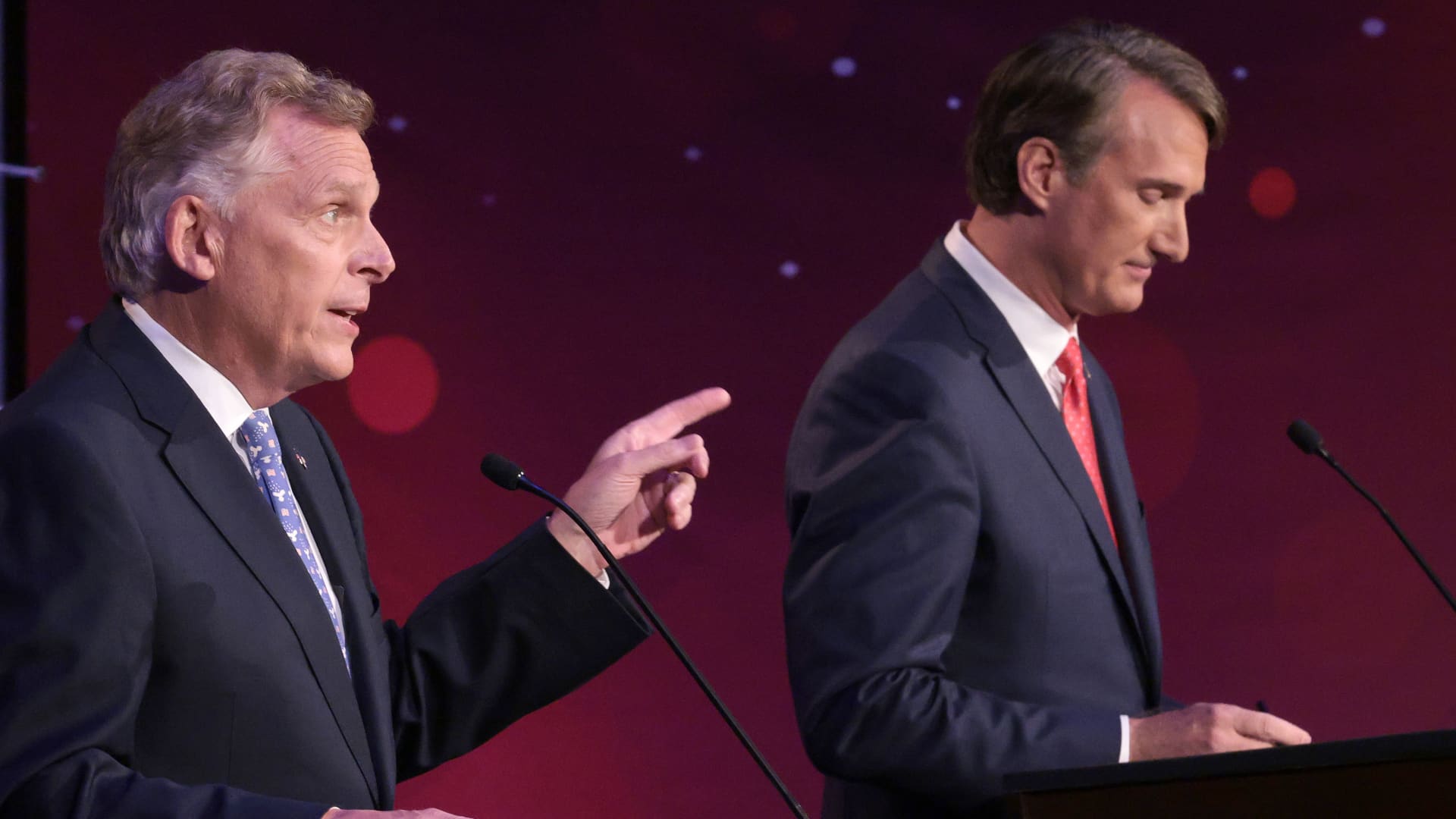
The Trump question
Another central issue in the race is Trump himself. The former president announced his endorsement for Youngkin in May, praising him for his "pro-Business, pro-Second Amendment, pro-Veterans, pro-America" approach.
Youngkin accepted the endorsement but has kept Trump at arm's length since winning the Republican Party's nomination, showing little interest in rallying alongside the former president and his allies.
For instance, Youngkin declined to appear at a "Take Back Virginia Rally" rally last week hosted by former Trump advisor Steve Bannon, according to NBC News.
While Youngkin has avoided any criticism of Trump, he has also maintained a distance from the former president's false claims about voter fraud in the 2020 election.
"There wasn't material fraud, and I believe that the election was certifiably fair," Youngkin said in the first gubernatorial debate last month.
Youngkin's efforts to separate himself from Trump are likely a tactic to help his odds in the race, according to Nicholas Goedert, an assistant political science professor of Virginia Polytechnic Institute and State University.
"Biden's falling poll numbers haven't really helped Trump increase his own popularity, especially in a state that has moved so far to the left over the last 10 years," Goedert said. "Someone who is openly campaigning as a Trump ally is not going to do very well. Youngkin has realized that."
Despite Youngkin's distance from Trump, McAuliffe has repeatedly called his Republican opponent a "Trump wannabe." He cites their overlapping stances on issues such as Covid mandates and critical race theory.
In response, Youngkin has lambasted McAuliffe for attempting to link him to Trump.
"The only person invoking Trump," Youngkin charged at the second gubernatorial debate, "is you."
"Terry, you just made folks in Las Vegas a lot of money," Youngkin said in the first gubernatorial debate a few weeks earlier. "There's an over/under tonight on how many times you're going to say 'Donald Trump,' and it was 10, and you just busted through it."
Trump has warned Youngkin to more closely align with his Make America Great Again movement.
"The only guys that win are the guys that embrace the MAGA movement," Trump said in an interview with conservative talk show host John Fredericks last month.
"They have to embrace it," he continued.
A bellwether state?
Virginia gubernatorial elections occur in the years after presidential elections. Some experts view them as a referendum on the party in the White House and a bellwether of how that party will perform in the midterms when control of the House and Senate will be at stake.
A bellwether in an election is usually a state or county that may predict how other areas of the nation will vote based on past voting outcomes.
"If you have to choose a bellwether, few states would be better choices than Virginia," said Stephen Farnsworth, a professor of political science at the University of Mary Washington in Virginia.
"Virginia has become a leading political indicator for the midterm elections because there are few statewide elections the year after a presidential contest," Farnsworth said.
Virginia's off-year gubernatorial elections have almost always favored whichever party wasn't occupying the White House. McAuliffe's first win in 2013, a year after Obama was reelected, has been the only exception since 1973.
And in recent years, some gubernatorial elections have indicated how parties would perform in the midterm elections a year later.
Northam's win in 2017 ended up being predictive of the Democratic environment in the midterms when the party swept Republicans out of their House majority, according to Kondik, of Sabato's Crystal Ball.
Years earlier, Republican Bob McDonald's gubernatorial win in 2009 also proved to predict his party's midterm performance when they ended Democratic control of Congress, Kondik said.
However, he noted that Virginia's gubernatorial elections do not always predict the outcome of midterms.
When McAuliffe won in 2013, Republicans still outperformed Democrats in the midterm elections a year later and achieved their largest majority in the House since 1928, Kondik said.
"I would say that it is a bellwether that can predict the midterms. Sometimes it does, sometimes it doesn't," Kondik said. "I think Virginia just gets a lot of attention because it's one of the only big state-level races in an odd-numbered year."
Both Hult and Goedert echoed this sentiment, saying that Virginia's gubernatorial elections are "overstated" as bellwethers for midterm elections.
White House press secretary Jen Psaki also downplayed the predictive power of the upcoming gubernatorial election in a press briefing last week.
"I will leave it to other outside analysis to convey that off-year elections are often not a bellwether, but — and there's a lot of history here in Virginia — again, we're going to do everything we can to help former Governor McAuliffe, and we believe in the agenda he's representing," Psaki told reporters on Thursday.
A day later, she was accused by a government ethics watchdog of violating a law barring executive branch employees from partisan politicking.
The home stretch
Election Day is fast approaching, and both campaigns will likely spend the next two weeks trying to motivate their partisan bases.
Despite McAuliffe's lead in some recent polls, Youngkin's supporters are more excited to vote in the upcoming election, according to the YouGov and CBS News poll.
Hult said Virginians can expect ads from both campaigns to blanket airways and digital spaces, which has occurred a fair amount already.
The two candidates have spent more than $18 million each on broadcast television ads alone, The New York Times reported, citing data from AdImpact.
Major figures in both parties will also ratchet up their support for their candidates.
Democrats are sending Obama to campaign alongside McAuliffe on Saturday. First lady Jill Biden and Stacey Abrams, a former state legislator in Georgia, appeared with McAuliffe last weekend.
While Youngkin didn't attend last week's "Take Back Virginia Rally," prominent MAGA figures and Trump, who spoke at the rally by phone, all reiterated their support for the Republican candidate.
"The next two weeks will see a lot more mobilization, continual appeals for turnout and nonstop commercial ads from the two candidates," Hult said.



